Of the bore and of the wulf
Svche desyren to be grete lordes / and dyspreysen his parents / that at the last becomen poure and fallen in to grete dishonour / As thow mayst see by this present fable /
Of a bore / whiche was amonge a grete herd of other swynes /
And for to haue lordship and domynacion ouer alle them / he beganne to make grete rumour / and shewed his grete teethe for to make the other swynes aferd / but by cause they knewe hym / they sette nought by hym / wherof he displeased moche / and wold goo in to a herd of sheep / and emonge lambes / And whanne he was amonge the lambes / he began to make grete rumour / and shewed his sharp and long teeth / And whanne the lambes herd hym / they were sore aferd / and byganne to shake for fere /
And thenne sayd the bore within hym self / here is the place wherin I must abyde & duelle For here I shalle be gretely worshipped / For euerychone quaken for fere of me /
Thenne came the wulf there for to haue and rauysshe somme proye / And the lambes beganne alle to flee / but the bore as prowd wold not stere hym / ne go fro the place / by cause he supposed to be lord / but the wulf toke hym / and bare hym in to the wode for to ete hym /
And as the wulf bare hym / it happed that he passid before the herd of swynes / whiche the bore had lefte /
And thenne whanne the bore perceyued and knewe them / he prayd and cryed to them / that for the loue of god they wold help hym / And that withoute her help / he was deed /
And thenne the swynes alle of one assent and owne wylle wente and recouered theyr felawe / and after slewe the wulf /
And as the bore was delyuerd / and sawe hym amonge the swynes / and that alle his doubte and fere was gone / he beganne to haue vergoyne and shame / by cause that he was thus departed / and gone fro theyr felauship and sayd to them / My bretheren and my frends / I am well worthy to haue had this payne / by cause / I was gone & departed from yow /
And therfore he that is wel / lete hym beware / that he moue not hym self / For suche by his pryde desyreth to be a grete lord / whiche ofte falleth in grete pouerte /
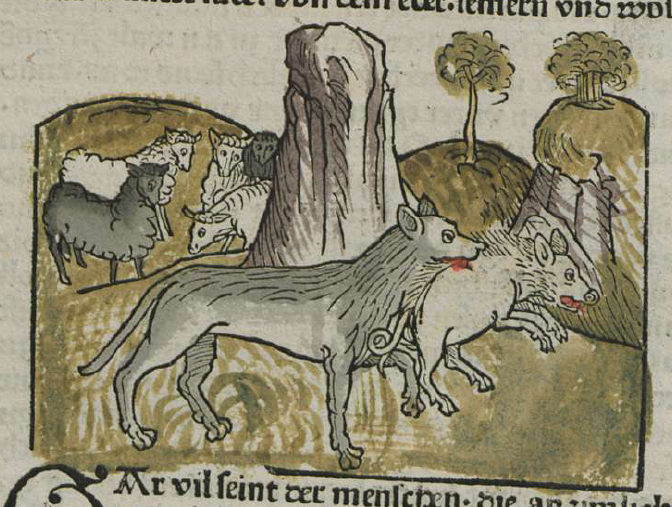
Of the dogge / of the wulf and of the whether
Grete folye is to a fool that hat no myght / that wylle begyle another stronger than hym self / as reherceth this fable
Of a fader of famylle whiche had a grete herd or flock of sheep / and had a grete dogge for to kepe them which was wel stronge /
And of his voys all the wolues were aferd wherfore the sheepherd slepte more surely / but it happed / that this dogge for his grete age deyde / wherfore the sheepherdes were sore troubled and wrothe / and sayd one to other / we shall nomore slepe at oure ease by cause that our dogge is dede / for the wulues shall now come and ete our sheep / and thenne a grete wether fyers and prowd / whiche herd alle these wordes came to them and sayd / I shalle gyue yow good counceylle / Shaue me / and put on me the skynne of the dogge
And whanne the wulues shalle see me / they shalle haue grete fere of me /
And whanne the wulues came and sawe the wether clothed with the skynne of the dogge / they beganne all to flee / and ranne awey / t happed on a day that a wulf whiche was sore hongry / came and toke a lambe / and after ran awaye therwith / And thenne the sayd wether ranne after hym /
And the wulf whiche supposed that it had ben the dogge shote thryes by the waye for the grete fere that he had /
And ranne euer as fast as he coude / and the wether also ranne after hym withoute cesse / tyl that he ranne thurgh a busshe full of sharp thornes / the whiche thornes rente and brake alle the dogges skynne / which was on hym /
And as the wulf loked and sawe behynde hym / beynge moche doubtuous of his dethe / sawe and perceyued alle the decepcion and falshede of the wether /
And forthwith retorned ageynste hym / and demaunded of hym / what beest arte thow /
And the wether ansuerd to hym in this maner / My lord I am a wether whiche playeth with the /
And the wulf sayd / Ha mayster ought ye to playe with your mayster and with your lord / thow hast made me so sore aferd / that by the weye as I ranne before the / I dyde shyte thre grete toordes /
And thenne the wulf ledde hym vnto the place where as he had shyte / sayenge thus to hym / Loke hyther / callest thow this a playe / I take hit not for playe / For now I shalle shewe to the / how thou oughtest not to playe so with thy lord /
And thenne the wulf took and kylled hym / and deuoured and ete hym /
And therfore he that is wyse muste take good hede / how he playeth with hym whiche is wyser / more sage / and more stronge / than hym self is /
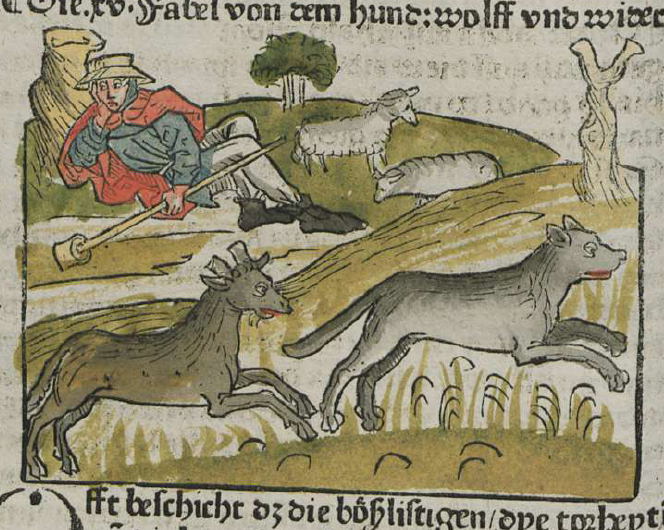
Of the dragon and of the kerle
Men ought not to rendre euylle for good / And them that helpen ought not to be letted / As reherceth thys fable
Of a dragon whiche was within a Ryuer / and as this Ryuer was dymynuysshed of water / the dragon abode at the Ryuage / whiche was al drye / And thus for lack of watre he coude not stere hym /
A labourer or vylane came thenne that waye / and demaunded of the dragon / what dost thow there /
And the dragon ansuerd to hym / I am here lefte withoute water / withoute whiche I can not meue / but yf thow wilt bynd me / and sette me vpon thyn asse / and lede me in to my Ryuer / I shal gyue to the habondaunce of gold and syluer /
And the vylane or chorle for couetyse bound and ledde hym in to his repayre /
And whanne he had vnbounden hym / he demaunded his sallary / and payment /
And the dragon sayd to hym / By cause that thow hast bounden me / thow wylt be payd And by cause that I am now hongry / I shalle ete the /
And the vylayne ansuerd and sayd / For to haue done wel / thow wylt ete and deuoure me /
And as they stryued to gyder / the foxe whiche was within the forest herd wel theyr question and different came to them / and sayd in this manere / Stryue ye no more to gyder / For I wyll acord / and make pees bytwixt you Late eche of yow telle to me his reason for to wete / whiche of yow hath ryght /
And whanne eche of them had told his caas the foxe sayd to the vylayne / Shewe thow to me / how thow boundest the dragon / to thende / that I may gyue therof a trewe and lawfull sentence /
And the vylayne put the dragon vpon his asse / and bound hym as he had done before /
And the fox demaunded of the dragon / helde he thenne the so fast bounden / as he dothe now /
And the dragon ansuerd / ye my lord / and yet more hard /
And the foxe sayd to the vylayn / Bynde hym yet more harder / For who that was wel byndeth / wel can he vnbynd
And whanne the dragon was fast and wel bounden / the fox sayd to the vylayne / bere hym ageyn there as thow fyrst tokest hym / And there thow shalt leue hym bounden as he is now / And thus shalle not ete ne deuoure the /
For he that dothe euylle / euylle he must haue / For Iustly he shall ben punysshed of god / they that done harme and dommage to the poure folke For who so euer rendreth euylle for good / he shalle therof iustly be rewarded
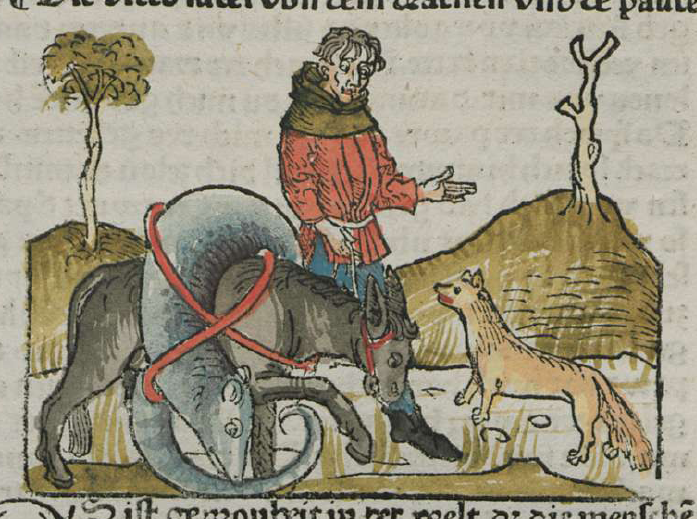
Of the enuyous dogge
None ought not to haue enuye of the good of other / As it appiereth by this fable /
Of a dogge whiche was enuyous / and that somtyme was within a stable of oxen / the whiche was ful of heye /
This dogge kept the oxen that they shold not entre in to theyr stable / and that they shold not ete of the sayd hey /
And thenne the oxen sayd to hym / Thow arte wel peruers and euylle to haue enuye of the good / the whiche is to vs nedefull and prouffitable / And thow hast of hit nought to doo / for thy kynde is not to ete no hey /
And thus he dyd of a grete bone / the whiche he held at his mouthe / and wold not leue hit by cause and for enuye of another dogge / whiche was therby /
And therfore kepe the wel fro the company or felauship of an enuyous body / For to haue to doo with hym hit is moche peryllous and dyffycyle / As to vs is wel shewen by Lucyfer
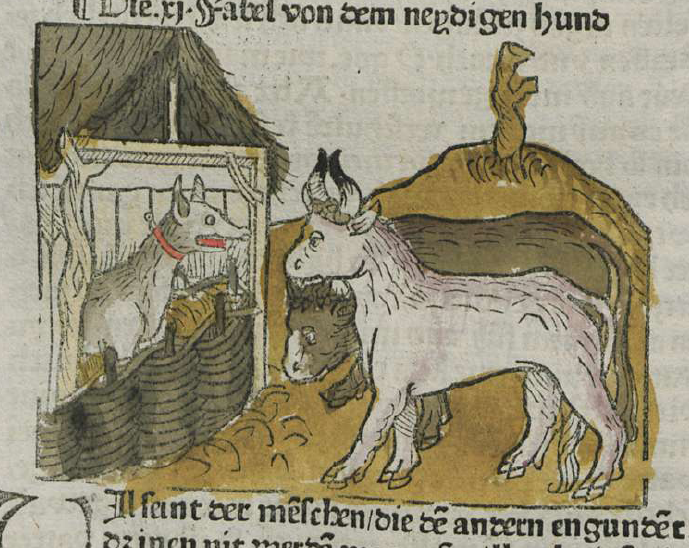
Of the foxe and of the catte
There is many folke / whiche auauncen them and saye that they ben wyse and subtyle / whiche ben grete fooles and knowynge no thynge / As this fable reherceth /
Of a foxe whiche somtyme mette with a Catte / to whome he sayd / My godsep / god yeue yow good daye /
And the catte ansuerd / My lord god gyue yow good lyf /
And thenne the foxe demaunded of hym / My godsep what canst thow doo /
And the catte sayd to hym / I can lepe a lytyl /
And the fox sayd to hym / Certaynly thow arte not worthy to lyue / by cause that thow canst nought doo /
And by cause that the cat was angry of the foxes wordes / he asked and demaunded of the foxe / And thow godsep what canst tow doo /
A thousand wyles haue I sayd the foxe / For I haue a sak ful of scyences and wyles / And I am so grete a clerke / that none may begyle ne deceyue me /
And as they were thus spekyng to gyder the cat perceyued a knyght comynge toward them / whiche had many dogges with hym / and sayd to the foxe / My godsep / certaynly I see a knyght / comynge hytherward / whiche ledeth with hym many dogges / the whiche as ye wel knowe ben our enemyes /
The foxe thenne ansuerd to the cat / My godsep / thou spekest lyke a coward / and as he that is aferd / lete them come and care not thow /
And Incontynently as the dogges perceyued and sawe the foxe and the catte / they beganne to renne vpon them /
And whanne the foxe sawe them come / he sayd to the kat / Flee we my broder / flee we /
To whome the kat ansuerd / Certaynly godsep / therof is none nede /
Neuertheles the foxe byleued not the cat / but fledde / and ranne as fast as he myght for to saue hym /
And the catte lepte vpon a tree and saued hym self / sayenge / Now shalle we see / who shalle playe best for to preserue and saue hym self /
And whanne the catte was vpon a tree / he loked aboute hym / and sawe how the dogges held the foxe with theyr teethe / to whome he cryed and seyd / O godsep and subtyle foxe / of thy thowsand wyles that syth late thow coudest doo / lete me now see / and shewe to me one of them /
The foxe ansuerd not / but was killed of the dogges and the catte was saued /
And therfore the wyse ought not to disprayse the symple / For suche supposeth to be moche wyse / whiche is a kynd and a very foole /
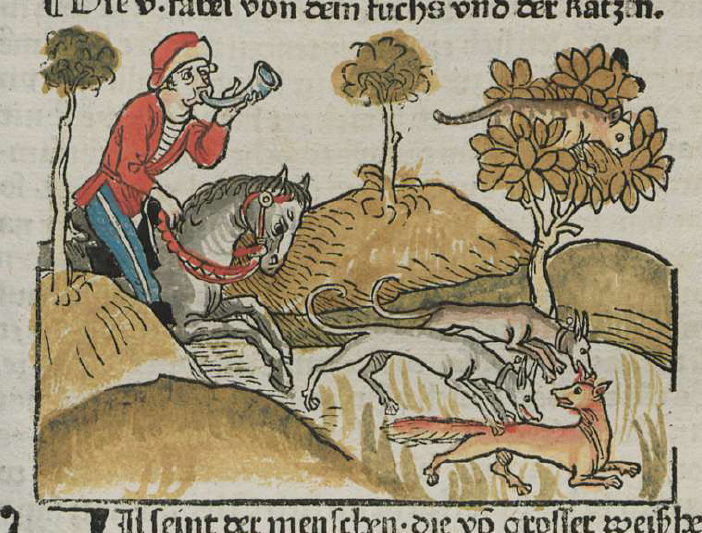
No comments:
Post a Comment
Comments are limited to Google accounts. You can also email me at laurakgibbs@gmail.com or find me at Twitter, @OnlineCrsLady.